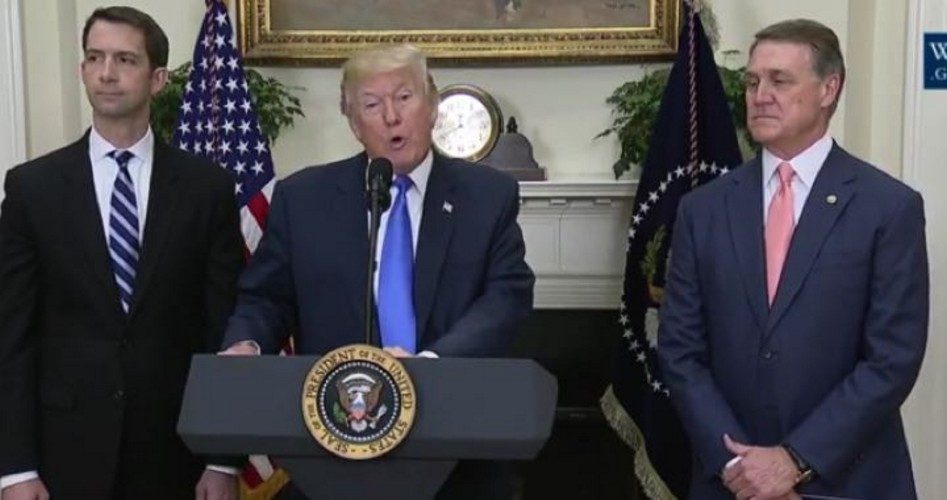
President Trump was joined at the White House on August 2 by Senators Tom Cotton (R-Ark.), shown on left, and David Perdue (R-Ga.), shown on right, to unveil a new immigration bill the senators introduced. The bill — the RAISE Act (S. 1720) — would replace the current permanent employment-visa system with a skills-based points system, similar to the systems used by Canada and Australia.
Additionally, the RAISE Act would retain immigration preferences for the spouses and minor children of U.S. citizens and legal permanent residents, while eliminating preferences for some extended family members.
It would also eliminate the current diversity visa lottery. The diversity lottery makes available 50,000 permanent resident visas annually and aims to diversify the immigrant population in the United States by selecting applicants from countries with low rates of immigration in the five years prior.
A statement released by the senators said: The Diversity Lottery is plagued with fraud, advances no economic or humanitarian interest, and does not even promote diversity. The RAISE Act would eliminate the 50,000 visas arbitrarily allocated to this lottery.
Finally, the RAISE Act would limit refugees offered permanent residency to 50,000 per year, a number that is in line with a 13-year average.
A June report in the Los Angeles Times noted that the number of refugees admitted to the United States has already been cut by nearly half in the first three months of the Trump administration compared with the final three months of the Obama presidency.
Government statistics released on June 23 showed that more than 25,000 refugees were permitted to enter and reside in the United States at the end of the Obama administration. In the initial months under President Trump, the number fell to 13,000.
The president and the senators touted the economic benefits to America of making job skills part of the evaluation process for granting visas to immigrants. Trump said:
The RAISE Act ends chain migration, and replaces our low-skilled system with a new points-based system for receiving a Green Card. This competitive application process will favor applicants who can speak English, financially support themselves and their families, and demonstrate skills that will contribute to our economy.
Cotton followed Trump’s statement with remarks of his own:
Our legal immigration system should accomplish two main goals: One, it should help American workers get a decent pay raise and have a higher standard of living. And, two, it should help promote economic growth to make America more competitive in the world.
Cotton noted that the United States currently admits over a million immigrants into this country each year, but only 1 in 15 of those immigrants come here because of their job skills and their ability to succeed in this economy. The senator said that puts great downward pressure on the wages of Americans who work with their hands and work on their feet. “I think it’s a symbol that we’re not committed to working-class Americans,” said Cotton.
Purdue followed and observed that he is the only Fortune 500 CEO in Congress and that his assessment of the new legislation is based on his considerable business experience. He explained the models on which the RAISE Act is based:
We looked at countries like Canada, Australia, and others. What we’re introducing today is modeled on the current Canadian and Australian systems. It’s pro-worker, it’s pro-growth, and it’s been proven to work. Both have been extremely successful in attracting highly skilled workers to those countries.
Purdue continued by stating that one thing everyone can agree on is that the goals of our nation’s immigration system should be to protect the interests of working Americans, including immigrants. He said we must also “welcome talented individuals who come here legally and want to work and make a better life for themselves.”
The Washington Post observed that groups that favor stricter immigration policies hailed the proposed legislation as a step in the right direction. Roy Beck, president of NumbersUSA, said the Raise Act “will do more than any other action to fulfill President Trump’s promises as a candidate to create an immigration system that puts the interests of American workers first.”
One area that the RAISE Act does not address is the H-1B visa program. We noted in an article in April that the Justice Department had recently issued a press statement warning employers petitioning for H-1B visas for the next fiscal year not to discriminate against U.S. workers. The release explained that the H-1B visa program allows companies in the United States to temporarily employ foreign workers in specialty occupations such as science and information technology.
While such skilled workers would undoubtedly qualify for employment visas under the RAISE Act, the April release warned employers: “The Justice Department will not tolerate employers misusing the H-1B visa process to discriminate against U.S. workers.”
The release quoted Acting Assistant Attorney General Tom Wheeler of the Civil Rights Division, who said: “U.S. workers should not be placed in a disfavored status, and the department is wholeheartedly committed to investigating and vigorously prosecuting these claims.”
While the RAISE Act’s language clearly favors granting visas to skilled workers, the statement from the Justice Department made it just as clear that the Trump administration does not want employers to provide H-1B visas to those workers if it means displacing Americans from their jobs.
Image: Screenshot from Whitehouse.gov
Related articles:
American IT Workers Complain of Losing Jobs to Foreign H-1B Visa Holders
Sen. Sessions, Rep. Brat Warn Colleagues to Curb Immigration
Sen. Grassley Chides Obama Administration for L-1B Visa Memorandum
Immigration Overload: Record 42.1 Million (Im)migrants in U.S.
DHS Extends Employment Authorization to Spouses of H-1B Visa Holders
NSA Taps Directly Into Undersea Fiber-optic Data Cables
Conservatives in Congress Slam Immigration Bill of “Gang of Eight”


